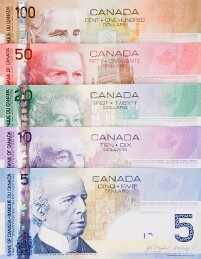The Canadian dollar is strengthening to a one-week high against its American counterpart midweek on rallying energy prices and slowing US inflation. The bearish domestic outlook is lingering in the background as investors fear that, despite the impressive February jobs report, the national economy is barely expanding, even with the pause on interest rate hikes.
Crude prices were supported by two US Energy Information Administration (EIA) reports. The first showed that domestic inventories plunged 3.9 million barrels for the week ending March 8 and US output tumbled 100,000 barrels to 12 million barrels per day (bpd). The second was a forecast that WTI prices would climb by 2.4% to $56.13 a barrel.
Oil futures found additional support on reports that Saudi Arabia wants to slash its production further beyond the April deadline, leading some speculation that the Organization of the Petroleum-Exporting Countries (OPEC) members will follow suit to boost prices. Saudi Energy Minister Khalid al-Falih has noted that an end to OPEC-led supply cuts was unlikely to happen before June.
In addition, with the unrest in Libya, the US sanctions against Iran and Venezuela, and falling domestic output, the global supply glut may vanish.
On Wednesday, April West Texas Intermediate (WTI) futures surged $1.40, or 2.46%, to $58.27 per barrel on the New York Mercantile Exchange.
Crude oil remains one of the countryâs biggest exports, so any movement in prices affects the Canadian economy.
The Canadian dollar further benefited from slowing US inflation as consumer prices recorded the smallest annual gain since the middle of 2016.
Any gains in the loonie were capped on concerns over the economy. Even with the strong February labor report â the third month of outsized jobs gains in the last four â the gross domestic product (GDP) barely budged in the fourth quarter, leading to the Bank of Canada (BOC) to be more dovish on interest rates. The BOC recently conceded that it was surprised how weak the October-to-December numbers were.
The USD/CAD currency pair slumped 0.26% to 1.3317, from an opening of 1.3357, at 18:48 GMT on Wednesday. The EUR/CAD dipped 0.03% to 1.5063, from an opening of 1.5072.
If you have any questions, comments or opinions regarding the Canadian Dollar,
feel free to post them using the commentary form below.
Canadian Dollar Strengthens on Rallying Energy Prices
